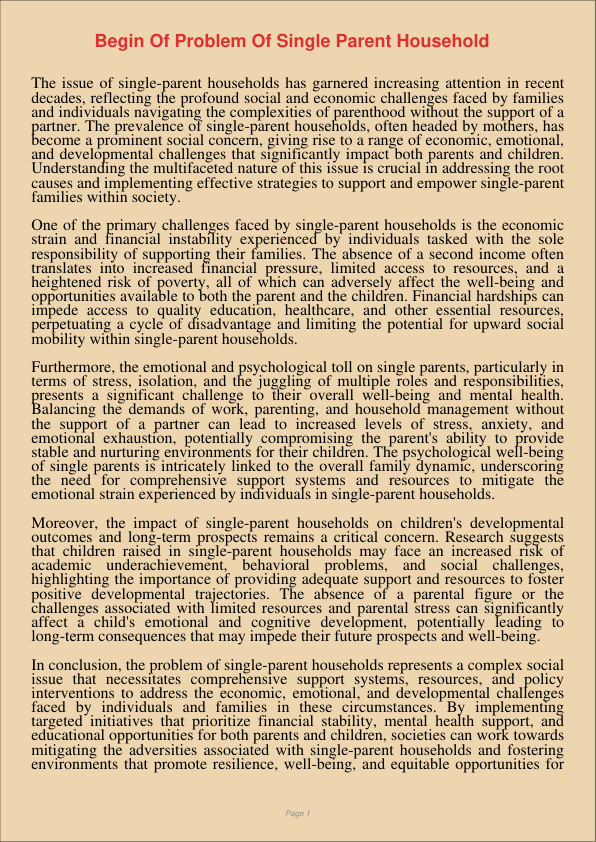Begin Of Problem Of Single Parent Household
Jan 9, 2024
single parent household
problem
Information Technology
Business
The issue of single-parent households has garnered increasing attention in recent decades, reflecting the profound social and economic challenges faced by families and individuals navigating the complexities of parenthood without the support of a partner. The prevalence of single-parent households, often headed by mothers, has become a prominent social concern, giving rise to a range of economic, emotional, and developmental challenges that significantly impact both parents and children. Understanding the multifaceted nature of this issue is crucial in addressing the root causes and implementing effective strategies to support and empower single-parent families within society.
One of the primary challenges faced by single-parent households is the economic strain and financial instability experienced by individuals tasked with the sole responsibility of supporting their families. The absence of a second income often translates into increased financial pressure, limited access to resources, and a heightened risk of poverty, all of which can adversely affect the well-being and opportunities available to both the parent and the children. Financial hardships can impede access to quality education, healthcare, and other essential resources, perpetuating a cycle of disadvantage and limiting the potential for upward social mobility within single-parent households.
Furthermore, the emotional and psychological toll on single parents, particularly in terms of stress, isolation, and the juggling of multiple roles and responsibilities, presents a significant challenge to their overall well-being and mental health. Balancing the demands of work, parenting, and household management without the support of a partner can lead to increased levels of stress, anxiety, and emotional exhaustion, potentially compromising the parent’s ability to provide stable and nurturing environments for their children. The psychological well-being of single parents is intricately linked to the overall family dynamic, underscoring the need for comprehensive support systems and resources to mitigate the emotional strain experienced by individuals in single-parent households.
Moreover, the impact of single-parent households on children’s developmental outcomes and long-term prospects remains a critical concern. Research suggests that children raised in single-parent households may face an increased risk of academic underachievement, behavioral problems, and social challenges, highlighting the importance of providing adequate support and resources to foster positive developmental trajectories. The absence of a parental figure or the challenges associated with limited resources and parental stress can significantly affect a child’s emotional and cognitive development, potentially leading to long-term consequences that may impede their future prospects and well-being.
In conclusion, the problem of single-parent households represents a complex social issue that necessitates comprehensive support systems, resources, and policy interventions to address the economic, emotional, and developmental challenges faced by individuals and families in these circumstances. By implementing targeted initiatives that prioritize financial stability, mental health support, and educational opportunities for both parents and children, societies can work towards mitigating the adversities associated with single-parent households and fostering environments that promote resilience, well-being, and equitable opportunities for all family structures. Understanding the multifaceted nature of this issue is crucial in fostering a more inclusive and supportive society that values the diverse experiences and needs of all families, regardless of their structure or composition.
